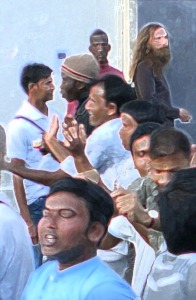Inverses, no. 10, the Europe issue is now on sale
 INVERSES, the French language magazine of queer literary analysis, has published its tenth issue, dedicated to the gay literary traditions of Europe. There are articles that discuss the books being published in the following countries:
INVERSES, the French language magazine of queer literary analysis, has published its tenth issue, dedicated to the gay literary traditions of Europe. There are articles that discuss the books being published in the following countries:
Germany
England
Spain
Greece
Italy
Netherlands
Portugal
Romania
Russia
Switzerland
The Czech Republic
Turkey
Ukraine.
Fantastic!!
I am happy to say that this issue includes an article by me about gay writers and writings dealing with homosexuality in Romania. It was a joy to work with INVERSES and a great experience to write this piece. The publication is all in French (my article was translated from English for this edition). If you are interested in learning more about INVERSES and ordering a copy of this wonderfully informative edition, go to their website and take a look at what they have to offer. Click on the image above or right here: www.inverses.fr
Mazzucco’s Perfect Day: A novel of importance versus impotent political theater
“The Week of Foreign Cultures” was the ostensible excuse for inviting Melania Mazzucco to present her best selling novel, A Perfect Day, (Un Giorno Perfetto), but really, no excuse was necessary. It was a great opportunity to become familiar with this interesting new writer and as it turned out, it was also a great chance to ponder the efficacy (or the sad irrelevance) of French political theater.
First the novel, which is just appearing in bookstores in its French translation, as Un Jour Parfait. This being the Istituto Italiano di Cultura, a sort of imaginary land you might call Franco-Italia, the presentation was a mélange of two languages and two cultures. But one thing was certain, here literature would be talked about, rather than read. Mazzucco was interviewed by Fabio Gambaro who, to his credit, refrained from long winded introductions to his questions, and managed to steer Ms.
Mazzucco to explain the most pertinent aspects of her work.
Melania Mazzucco hardly needed any steering, though. She was dazzling, with her insightful comments and fascinating take on Italian civilization at this point. It is a point of crisis, she said, a point where Italy has stopped moving forward, as it comes to grips with the fact that the future will be nothing like the past. She is afraid that the country will follow the same trajectory as the Venetian Republic, which in its heydey, was a cosmopolitan city that conferred full citizenship on all residents who had paid taxes for a certain number of years. At some point, the city became self-conscious about its role and its culture, and severely limited this welcome. To Mazzucco’s thinking, this was one of the direct causes of the decline of Venice, and could very well be the impetus for the decline of Italy of today.
She also stated that she began to write this novel as soon as she finished with her earlier best selling work, Vita, a story that takes place exactly one hundred years earlier. In that novel, an Italian family moves to America to start a new life. In this novel, A Perfect Day, Italy has become the new land of opportunity for thousands of immigrants. Somehow, Mazzucco does not see Italy being able to handle that role.
The novel has been made into a major motion picture by renowned film director Ferzan Ozpetek (Un Giorno Perfetto at IMDb). In that adaptation, the story has been focused on two main characters, a working class Roman woman and her estranged husband.
When asked about her reaction to seeing her characters on film, Mazzucco said that it was a joy and a painful experience at the same time. It caused her great joy to see her characters come alive in the imagination of another artist, but she suffered, seeing that the main character, Emma, had come alive in a different way than she knew her. Ozpetek’s Emma, in the screenplay by Sandro Petraglia, is much more of a victim than Ms. Mazzucco had imagined her – after all, Emma chose her own life, and consciously made her decisions. I guess this is the kind of feelings that all parents have about their offspring, hoping they will become brain surgeons, and having to accept them when they become street mimes instead. Nothing wrong, just … different.
Here is a link to Variety’s review.
THE DISRUPTION!
At a certain point, after the questions and answers had been going on for almost an hour, I became aware of a group of people coming up the aisles from the back and taking seats. A fellow came and sat in the empty seat beside me, and two others sat in the first row. One ot those in the first row couldn’t contain himself, and after a couple of minutes, interrupted Gambaro and said he would like to ask a question. Mr. Gambaro told him that in a short while he would open it up to questions from the audience. The fellow next to me, who had been leaning about in his seat, holding his head and looking generally dismayed, eventually got up and went to the back, and when the questioning was over, the pony-tailed gent in the first row was invited to ask the first question. However, instead of asking a question, he launched into a short speech (in French) about the rights of people to cross borders, and asked the assembly to give him three minutes of our time. Then he invited his seat mate to read a letter, written by an inmate at a refugee center in Rome and translated to French. It was an embittered and accusatory statement about the ill treatment that he had received, calling the place the Guantanamo of Berlusconi and of a list of other Italian politicians. It accused the Red Cross workers of being prison wardens in that Guantanamo.
When he was done, Melania Mazzucco graciously attempted to tie this in with what she had been saying all evening, about the need for Italy to take the hard steps that are necessary to become a modern multicultural society, and that seemed to mollify the leader somewhat. The director of the institute, who was also seated in the first row, wouldn’t let it go at that, however. She countered with a somewhat polemical response, asking the intruders, who were apparently French, if they had also been to various other cultural centers, going so far as to name some by name, because “Italy is not a country of Nazis.” I understand her feelings, the interruption had been rude and unnecessarily hostile, and as the director of the cultural institute, I imagine that she felt personally violated and insulted. Nevertheless, her argument was specious and unpleasant. What did it matter if they had or hadn’t gone anywhere else? The accusations were about the Italian situation, not about anywhere else. But her second point was quite a bit more relevant. She said that she knew many people who

Melania Mazzucco
worked for the Red Cross and did not think that the characterization of them as prison wardens was fair. The “revolutionaries” shrugged this off, and distributed their flyers, a sort of manifesto calling for the elimination of all international borders. It was not signed by anybody, and gave no indication of who they were or how they wished to be engaged. When the generic flyers had been distributed, the whole group left, seemingly uninterested in knowing anything more about what was going on in this room.
It was a great contrast. Melania Mazzucco, who with her thoughtful, insightful and engaging literature, is trying to move Italian society forward, and the manifestanti pushing their way to the front to impose themselves on people, without the slightest regard for who we were or what this evening was all about. Certainly, the manifestantes went away thinking that they had really accomplished something, had pushed the problem into our faces and made us think, but in this they would be wrong. They just managed to make a grand display of irony. In order to protest the barriers built by Europe to keep out foreigners they were disrupting the celebration of other European culture in Paris, and in this case, a novel which in a far more coherent way, also is trying to break down those barriers. What they did was pure political theater, performed for the pleasure of the actors alone. They can now smugly put themselves to sleep tonight, on the surface they had stood up for human rights, but on a subconscious level, they had fed their hungry chauvinistic egos, by emphasizing the barbarism of France’s European neighbors while downplaying France’s own sins in this area (the appalling situation at Calais was reduced to a “political spectacle” in their handouts) and by neutralizing an incursion of Italian culture in the glorious capital of France weren’t they doing the devil’s work that they were so riled up about? It was pure activist masturbation. And it was completely ineffectual, it was sort of like protesting the incivility of modern society by shouting at the person sitting next to you on the subway. This type of action does more harm for the people it tries to help that they know.
But they were sadly charming, with their manifesto calling for the dismantling of all state borders. It’s like calling for the abolition of money, demanding that people stop speaking English, or that all universities immediately confer degrees on all their students. It’s a meaningless demand, because it ignores all the steps between here and there, and would create ten new problems for every old one solved. They reminded me of the 1970s. Does anyone remember the 1970s?
THE MANIFESTO!
In any case, these people have their hearts in the right place, so as my own little gesture of solidarity, I give here my English translation of their French language manifesto. This is the entire manifesto, unsigned. It takes as its theme, “Sublimons les frontiers” the hardly translatable slogan of this week’s “Semaine des cultures étrangères.” Let’s sublimate/ idealize/ celebrate/ evaporate the borders.:
Apart from the exhibitions, debates, art openings concerts and other celebrations to which we have been invited under the heading of “Let’s Celebrate the Borders,” it would seem appropriate to ask ourselves what does this geographical and political space, the Schengen Area, really mean, this place where the borders have supposedly disappeared.
What does the disappearance of borders within this area mean in reality?
First of all, it means the externalization of border controls at the European gates, in agreement with countries like Libya, Turkey and the Ukraine, where camps have been financed to detain foreigners deemed undesirable. It is also the stepping up of controls inside the territory and diffusion of checkpoints at consulates, police precincts, detention centers and also on the streets, where every identity check can lead to expulsion.
It is the transborder cooperation for checking and internal security: every country that wishes to be part of the European Union is forced to develop surveillance techniques at their external borders. In other words, to become part of Europe, they must mobilize to make a grand show of putting up solid borders.
It is the judicial standardization which allows countries to make unapproved visits into a crime in order to punish undesirable foreigners and to lengthen the legal limit of detention time in order to give authorities the chance to expel them.
It is the construction of ever more prisons, detention centers and waiting zones in order to better manage the flow, that is, to detain, separate and expel foreigners.
It is police cooperation in all the countries, notably via Frontex, to better hold back people before they ever get their foot into the territory and to organize European group expulsions, which are less costly than individual expulsion.
It is the standardization of the list of countries requiring a visa, in other words, the poor countries from which visitors are not welcome. It is therefore possible to exclude people from the entire territory of the EU.
And in spite of all this, men and women who have been refused entry continue to choose to cross the border.
These borders, which have supposedly disappeared, and which we are now “sublimating,” what are they?
They are Somalis who have starved and thirsted to death, burnt by the sun, left dying for dozens of days in rubber dinghies cast adrift between Malta and Italy.
They are Eritrean women raped on a daily basis in camps in Libya, financed by the EU.
They are the Africans who have drowned in the Straits of Gibraltar while trying to reach the Spanish shores.
They are the teenagers who try to escape war and who call for our help from the immigration prison at Pagani in Greece.
They are the hundreds of Afghanis, Iraqis and other human beings who find themselves starring in the political spectacle of their own burning huts at Calais.
They are the eleven people burned alive in their detention center at Schipol in the Netherlands.
They are also Gaganpreet Singh K,. 20 years old, asylum seeker, imprisoned in Austria, who died while on hunger strike for over a month; Salem Souli, left to die without proper care at the detention center at Vincennes; Hassan, who died after suffering all night in the identification and expulsion center in Turin; Armen who died of illness while imprisoned at the center in Bruges; Mabruka, a Tunisian mother who committed suicide the night before her expulsion, in the Ponte Galeria prison in Rome; Kazim, 22 years old who killed himself in his cell at Canet in Marseilles or Ebnizer Folefack who hung himself at the center at Merkplas after being savagely beaten by the police who were about to expel him.
Europe, finally, they are the thousands of nameless people who have been controlled, detained and forceably displaced in order to better exploit them and to preserve the well being of some few others.
But all the barriers in the world, all the helicopters and boats of Frontex, all the most sophisticated systems of control and all the files can never stop the thousands who, by choice or by necessity, decide one day to set out for a better life somewhere else. Whether it be in Belgium, Italy, France or anywhere else, some nameless people, with or without their proper papers, are sometimes able to revolt against the checkpoints, the detention centers, the expulsions. With all of them, with all the people that are able to jump the borders and escape the detention centers from Milan to Vincennes, by way of Gandufa in Libya and Rotterdam or wherever people are detained, expelled or killed, we proclaim our solidarity.
DOWN WITH BORDERS!
El Gran Varon: Willie Colon’s story of Simon is 20 years old
 UPDATE: This song is now over 25 years old! But I am proud to leave this article posted as is. It is the most popular article on my bloblot and continues to draw readers after six years. Simon is truly timeless.
UPDATE: This song is now over 25 years old! But I am proud to leave this article posted as is. It is the most popular article on my bloblot and continues to draw readers after six years. Simon is truly timeless.
Twenty years ago, one of the great New York salsa artists, Willie Colon, released an album containing what would become an enduring classic of salsa music, as powerful for its message as for its fantastic style, the story of Simon, “El Gran Varon.” Willie Colon (pronounced Colón) was born in New York City in 1950, and became a headliner at venues like the Corso Ballroom and the Cheetah when he was still in his early twenties. Throughout the 1970s and 80s he built up a loyal following for his work with the Fania All Stars and artists like Hector Lavoe. This album, entitled “Top Secret” was his last for the Fania label, and it features Colon with his trombone and distinctive vocals, and his own orchestra, Legal Aliens. The song “El Gran Varon” was not thought of as a potential hit, or at least it was not initially presented as a candidate for such, perhaps because of the risky territory it covered. It was a song about AIDS and the isolation that homophobia and stigmatization bring.
Salsa is a powerful style, capable of expressing a great variety of emotions with its wide repertoire of rhythms, dynamics and tonalities. It has a basic structure but many origins, from African rhythms, to the clubs of Puerto Rico, Cuba, New York and the Caribbean as a whole. The New York style, of which Willie Colon was a leading exponent, was nurtured in its formative years in the jazz world of Manhattan in the forties and fifties (that is, the West Forties and the Nineteen Fifties), where jazz bands and salsa bands would sit in on each other’s gigs. Improvisation and idiosyncratic flair were highly prized elements there, as evidenced by the elaborate solos and characteristic free-form piano bridges.
Willie Colon’s trombone was a part of this tradition but in this song, his innovation is so much more: in the words of a timely, modern and tragic story within the framework of a traditional salsa structure. To my knowledge, he was the first well known artist, singing either in Spanish or in English, to allude so specifically to the horrifying epidemic that was devastating young victims in cities like New York, San Francisco, Miami and San Juan. It was not without its risks. If Caribbean culture has a famously vibrant gay element to it, quite apparent to those with even a passing acquaintance with the culture, it is kept in line and overshadowed by a virulent sense of honor that insists on presenting a macho image to the world. Add to that the stigma attached to this disease, not only in Puerto Rican culture, but in American culture as a whole during that period. It all could have very easily damaged Colon’s career.
Yet, he believed in this song, and with his distinctive metallic tenor voice and the perfect timing and sound of his superb orchestra, Willie Colon renders an unforgettable performance. El Gran Varon became perhaps Colon’s greatest hit and a staple of his concerts. In later years he updated the chronology, moving Simon’s dates of birth and death up seven years to 1963 and 1993. Perhaps he did this to emphasize the ongoing nature of this epidemic, but to my mind, the song is indelibly associated with the 1980s, with the terrible panic and despair of those first few years of epidemic, and of the emotional release that this song brought. Something beautiful could come out of this tragedy, some lesson learned, some community created, all in a great song to dance to and to celebrate life!
The song was recorded in 1988 and became part of Colon’s live show, then the album was released in June of 1989 and El Gran Varon quickly became a staple of salsa radio and disco. Part of its success might be the way that this performance elicits an emotional response without being maudlin, prissy or preachy. It is a difficult balancing act, and the many unsuccessful attempts to duplicate the success of Willie Colon with this material attest to that fact. A film was made in Mexico in 2002 based on this song, “Simon, el Gran Varon.” Unfortunately, this film is widely considered unsuccessful and cartoonish. Other artists have done covers of the song El Gran Varon, but nothing equals the original. I had a link here to a live performance of the song in Venezuela, but it was disabled. At any rate, you can find the song easily on you tube by searching willie colon el gran varon.
The lyrics were written by Omar Alfanno. When you read the words, you get a sense of just how much story has been packed into this one song. It is finely crafted, and quite effective in Spanish, drawing on many familiar sources, from the Mexican proverb about the bent tree to the Bible proverb about casting stones, and even giving elegant form to the lemonade adage attributed to the actress Joan Collins. Unfortunately, it’s not possible to reproduce the smooth prose of these lyrics and remain true to the words at the same time. Here is my English translation, as faithful to the original as the language will allow:
El Gran Varon, The Big Man
In a hospital room,
At 9:43, Simon was born.
It was the summer of ’56,
He was the pride of Don Andrés,
Because he was a boy.
He was brought up like everyone else,
With a tough hand and severity, he never talked back.
When you grow up, you’re going to study the same b.s. like your father.
Listen good, you have to be a big man.
Simon left the country, and far from home he forgot all about that sermon.
He changed his way of walking, he wore a skirt, lipstick and carried a handbag.
People say that one day his father went to visit him by surprise. Wow, what a mistake!
A woman walked by and spoke to him: Hello, daddy, how are you?
Don’t you recognize me? It’s me, Simon! Simon, your son, the big man!
Chorus:
You can never correct nature, the tree that is born bent will never straighten its trunk.
But he cared too much what people would say.
He never spoke to his son again, and he left him forever.
Don’t complain, Andrés, don’t complain at all.
If it’s lemons that fall from the sky then learn how to make lemonade.
Then as the years passed, Andrés thought better,
and he became furious that his son never wrote to him.
Finally he received news about whatever happened to his son,
And Andrés never forgot the day that he received that sad call.
In a hospital room,
With a strange disease
Simon died.
It was the summer of ’86,
And at the bedside of patient number ten,
Nobody cried.
You have to have pity, and quit the moralizing,
Those who are free of sin should cast the first stone.
And he who can never forgive, has the most certain fate,
Of living with his bitter regrets in his own private hell.
-
Archives
- July 2015 (1)
- June 2015 (1)
- November 2014 (1)
- July 2014 (1)
- June 2014 (4)
- September 2012 (1)
- August 2012 (1)
- March 2012 (3)
- February 2012 (3)
- October 2011 (1)
- September 2011 (5)
- August 2011 (3)
-
Categories
-
RSS
Entries RSS
Comments RSS









